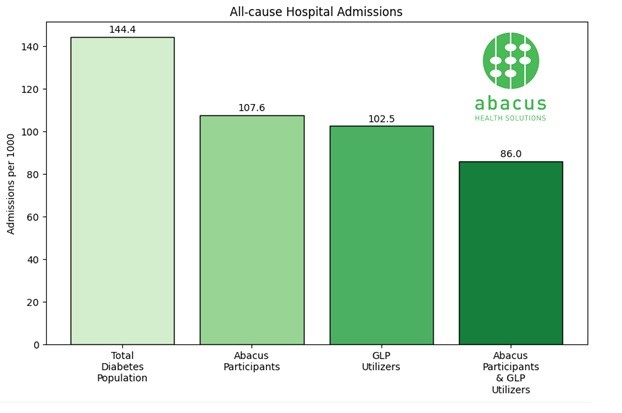In National Diabetes Awareness Month, Abacus Health Solutions announces the results of a cost savings analysis of their patented Diabetes Care Rewards Program. Over the last 17 years, Abacus has continued to innovate and provide its Diabetes Program to individuals through their employers. The Program incentivizes long-term health behaviors and has proven to dramatically reduce costs of diabetes care for both employers and individuals with all types of diabetes.
Demand for GLP medications has grown as diabetes is the fastest-growing chronic disease globally. Newer GLP medications, Ozempic and Mounjaro, have a lot of research support for the clinical value for diabetes members, including blood glucose control, weight loss, and reduced cardiovascular events.
While GLP medications are an effective treatment for Type 2 diabetes, the cost can be a barrier to many people and their employers. With an average cost of over $1,000 per monthly fill, many employers are struggling with skyrocketing use.
An analysis was conducted using medical and pharmacy claims data for a large municipal client who has been using the Abacus Program for three years. The client has over 70,000 total lives on their collective health plans and over 4,000 members with diabetes. The results in the chart below show how these expensive medications can add value by having a significant impact on reducing costly hospital admissions in a diabetic population. Diabetes is a top driver of healthcare expenses for employers and inpatient costs are the largest segment of diabetes costs, which can cost an average of $30,000 – $50,000 or more per each hospital admission.
In the most recent 12 months of claims data for the client’s overall diabetes population, those using GLP medications had 29% fewer hospital admissions than the overall diabetes population. An even greater impact was seen combining GLP use with participation in the Abacus program, with this group having 40% less admissions. This highlights the impact these medications, along with proper care, can have on diabetes risk and events that drive costs for employers.
Abacus has seen similar financial results on the impact of GLP medications reducing hospital admissions hold up when analyzing the data for other clients including a Fortune 500 company and across their broader book of business.
“Our program is particularly effective in engaging individuals whose histories indicate they are at higher risk to be hospitalized, including having had a history of cardiovascular disease and other chronic health conditions. Despite being at higher risk, our participants in the Program end up being hospitalized less often compared to non-participants.” said Edward Aberger, PhD, Abacus co-founder. “We are helping to lower risk in higher risk individuals with diabetes. Now our data is able to show our employer clients the impact of their pharmacy spend on their overall healthcare expenses.”.
There is much more to diabetes care than GLP medications. Abacus makes sure its participants who are on GLP medications are also doing the other important behaviors to manage their diabetes. Most people with diabetes have gaps in preventative care activities, but those actively engaged in the Abacus Program have more doctor visits, fewer preventative care gaps, more persistent medication use, less serious adverse health outcomes and avoid costly hospitalizations.





